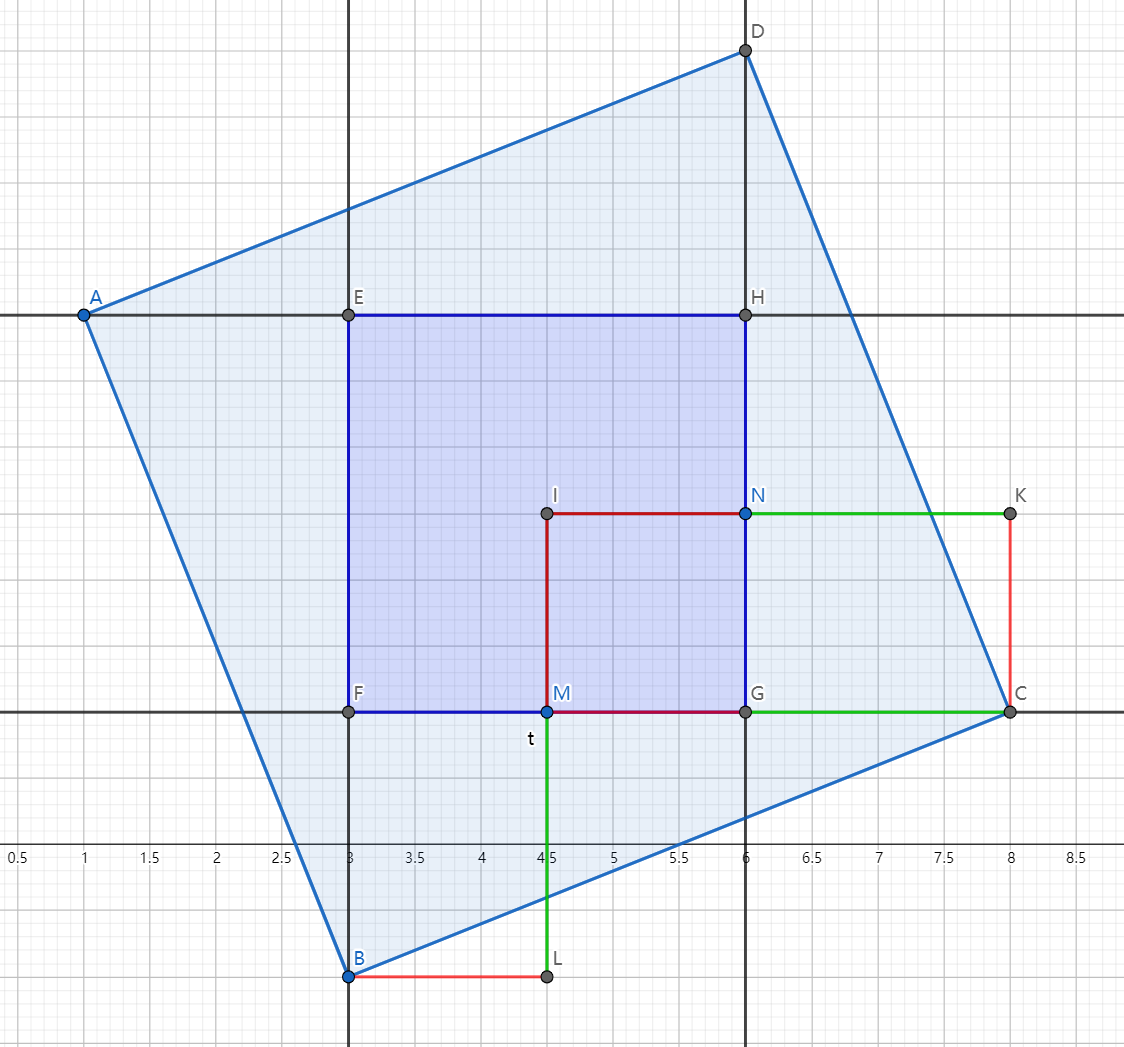1
2
3
4
5
6
7
8
9
10
11
12
13
14
15
16
17
18
19
20
21
22
23
24
25
26
27
28
29
30
31
32
33
34
35
36
37
38
39
40
41
42
43
44
45
46
47
48
49
50
51
52
53
54
55
56
57
58
59
60
61
62
63
64
65
66
67
68
69
70
71
72
73
74
75
76
77
78
79
80
81
82
83
84
85
86
87
88
89
90
91
92
93
94
95
96
97
98
99
100
101
102
103
104
105
106
107
108
109
110
111
112
113
114
115
116
117
118
119
120
121
122
123
124
125
126
127
128
129
130
131
132
133
134
135
136
137
138
139
140
141
142
143
144
145
146
147
148
149
150
151
152
153
154
155
156
157
158
159
160
161
162
163
164
165
166
167
168
169
170
171
172
173
174
175
176
177
178
179
180
|
#pragma GCC optimize(3,"Ofast","inline")
#include <iostream>
#include <cstdio>
#include <cstring>
#include <algorithm>
#include <cmath>
#include <vector>
#include <string>
#define maxn 100005
using namespace std;
const double eps = 1e-8;
int sgn(double x){
if(fabs(x) < eps) return 0;
return x > 0 ? 1 : -1;
}
struct Point{
double x, y;
Point(){}
Point(double _x, double _y){ x = _x; y = _y; }
Point operator +(const Point &A){
return Point(x + A.x, y + A.y);
}
Point operator -(const Point &A){
return Point(x - A.x, y - A.y);
}
double operator *(const Point &A){
return x * A.x + y * A.y;
}
double operator ^(const Point &A){
return x * A.y - y * A.x;
}
void print() {
printf("[Point] x:%.2lf, y:%.2lf\n", x, y);
}
};
struct Line{
Point s, e;
Line(){}
Line(Point _s, Point _e){ s = _s; e = _e; }
Point crosspoint(Line v){
double a1 = (v.e - v.s) ^ (s - v.s);
double a2 = (v.e - v.s) ^ (e - v.s);
return Point((s.x * a2 - e.x * a1) / (a2 - a1), (s.y * a2 - e.y * a1) / (a2 - a1));
}
int segcrossseg(Line v) {
int d1 = sgn((e - s) ^ (v.s - s));
int d2 = sgn((e - s) ^ (v.e - s));
int d3 = sgn((v.e - v.s) ^ (s - v.s));
int d4 = sgn((v.e - v.s) ^ (e - v.s));
if ((d1 ^ d2) == -2 && (d3 ^ d4) == -2) return 2;
return (d1 == 0 && sgn((v.s - s) * (v.s - e)) <= 0) ||
(d2 == 0 && sgn((v.e - s) * (v.e - e)) <= 0) ||
(d3 == 0 && sgn((s - v.s) * (s - v.e)) <= 0) ||
(d4 == 0 && sgn((e - v.s) * (e - v.e)) <= 0);
}
void print() {
printf("[Line] x1:%.2lf, y1:%.2lf x2:%.2lf y2:%.2lf\n", s.x, s.y, e.x, e.y);
}
};
struct Geometry{
char id;
vector<Line> v;
}G[maxn];
void Print(char r, vector<char> ID){
if(ID.empty()){
cout << r << " has no intersections\n";
}
else if((int)(ID.size()) == 1){
cout << r << " intersects with " << ID[0] << '\n';
}
else if((int)(ID.size()) == 2){
cout << r << " intersects with " << ID[0] << " and " << ID[1] << '\n';
}
else{
int siz = ID.size();
cout << r << " intersects with ";
for(int i = 0; i < siz - 1; i++){
cout << ID[i] << ", ";
}
cout << "and " << ID[siz - 1] << '\n';
}
}
void Polygon(vector<Point> &A, vector<Line> &X){
int siz = A.size();
for(int i = 0; i < siz - 1; i++){
X.push_back(Line(A[i], A[i + 1]));
}
X.push_back(Line(A[siz - 1], A[0]));
}
void Solve(string str, Geometry &X){
X.id = str[0];
vector<Point> P;
int len = str.length();
for(int i = 0; i < len; i++){
if(str[i] == '('){
int nx, ny, pos = i, f = 1, val = 0;
while(pos < len && str[pos] < '0' || str[pos] > '9'){
if(str[pos] == '-') f = -1;
pos++;
}
while(pos < len && str[pos] >= '0' && str[pos] <= '9'){
val = val * 10 + (str[pos] - '0');
pos++;
}
nx = val * f;
f = 1, val = 0;
while(pos < len && str[pos] < '0' || str[pos] > '9'){
if(str[pos] == '-') f = -1;
pos++;
}
while(pos < len && str[pos] >= '0' && str[pos] <= '9'){
val = val * 10 + (str[pos] - '0');
pos++;
}
ny = val * f;
P.push_back(Point(nx, ny));
}
}
if(str.find("square") != string::npos){
double cx = P[0].x, cy = P[0].y, tx = P[1].x, ty = P[1].y;
double nx1 = (cx + tx + cy - ty) / 2, ny1 = (cy + ty - cx + tx) / 2;
double nx2 = (cx + tx - cy + ty) / 2, ny2 = (cy + ty + cx - tx) / 2;
P.push_back(Point(nx1, ny1)); P.push_back(Point(nx2, ny2)); swap(P[1], P[2]);
Polygon(P, X.v);
}
else if(str.find("rectangle") != string::npos){
Point D = P[0] + (P[2] - P[1]); P.push_back(D);
Polygon(P, X.v);
}
else{
Polygon(P, X.v);
}
}
bool check(vector<Line> v1, vector<Line> v2){
for(int i = 0; i < v1.size(); i++)
for(int j = 0; j < v2.size(); j++){
if(v1[i].segcrossseg(v2[j])){
return true;
}
}
return false;
}
bool cmp(const Geometry &A, const Geometry &B){
return A.id < B.id;
}
int main(void)
{
string str;
while(getline(cin, str) && str != "."){
for(int i = 1; i <= 30; i++) G[i].v.clear();
int cnt = 0;
do{
Solve(str, G[++cnt]);
} while(getline(cin, str) && str != "-");
sort(G + 1, G + cnt + 1, cmp);
for(int i = 1; i <= cnt; i++){
vector<char> cpI;
for(int j = 1; j <= cnt; j++){
if(i == j) continue;
if(check(G[i].v, G[j].v)) cpI.push_back(G[j].id);
}
Print(G[i].id, cpI);
}
cout << '\n';
}
return 0;
}
|
